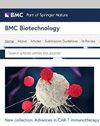Anti-inflammatory potential of aspergillus unguis SP51-EGY: TLR4-dependent effects & chemical diversity via Q-TOF LC-HRMS
IF 3.4
3区 生物学
Q2 BIOTECHNOLOGY & APPLIED MICROBIOLOGY
引用次数: 0
Abstract
Inflammation serves as an intricate defense mechanism for tissue repair. However, overactivation of TLR4-mediated inflammation by lipopolysaccharide (LPS) can lead to detrimental outcomes such as sepsis, acute lung injury, and chronic inflammation, often associated with cancer and autoimmune diseases. This study delves into the anti-inflammatory properties of “Aspergillus unguis isolate SP51-EGY” on LPS-stimulated RAW 264.7 macrophages. Through real-time qPCR, we assessed the expression levels of pivotal inflammatory genes, including iNOS, COX-2, TNF-α, and IL-6. Remarkably, our fungal extracts significantly diminished NO production and showed noteworthy reductions in the mRNA expression levels of the aforementioned genes. Furthermore, while Nrf2 is typically associated with modulating inflammatory responses, our findings indicate that the anti-inflammatory effects of our extracts are not Nrf2-dependent. Moreover, the chemical diversity of the potent extract (B Sh F) was elucidated using Q-TOF LC-HRMS, identifying 54 compounds, some of which played vital roles in suppressing inflammation. Most notably, compounds like granisetron, fenofibrate, and umbelliprenin were found to downregulate TNF-α, IL-1β, and IL-6 through the NF-κB signaling pathway. In conclusion, “Aspergillus unguis isolate SP51-EGY”, isolated from the Red Sea, Egypt, has been unveiled as a promising TLR4 inhibitor with significant anti-inflammatory potentials, presenting novel insights for their potential therapeutic use in inflammation.unguis SP51-EGY 的抗炎潜力:通过 Q-TOF LC-HRMS 分析 TLR4 依赖性效应和化学多样性
炎症是一种复杂的组织修复防御机制。然而,脂多糖(LPS)过度激活 TLR4 介导的炎症可导致败血症、急性肺损伤和慢性炎症等有害结果,而慢性炎症通常与癌症和自身免疫性疾病相关。本研究探讨了" Unguis 曲霉分离物 SP51-EGY "对 LPS 刺激的 RAW 264.7 巨噬细胞的抗炎特性。通过实时 qPCR,我们评估了关键炎症基因的表达水平,包括 iNOS、COX-2、TNF-α 和 IL-6。值得注意的是,我们的真菌提取物明显减少了 NO 的产生,并显著降低了上述基因的 mRNA 表达水平。此外,虽然 Nrf2 通常与调节炎症反应有关,但我们的研究结果表明,我们提取物的抗炎作用并不依赖于 Nrf2。此外,我们还利用 Q-TOF LC-HRMS 对强效提取物(B Sh F)的化学多样性进行了阐释,鉴定出 54 种化合物,其中一些在抑制炎症方面发挥了重要作用。最值得注意的是,研究发现格拉司琼、非诺贝特和脐橙素等化合物可通过 NF-κB 信号通路下调 TNF-α、IL-1β 和 IL-6。总之,从埃及红海分离出的 "unguis曲霉分离物SP51-EGY "是一种很有前途的TLR4抑制剂,具有显著的抗炎潜力,为其在炎症中的潜在治疗用途提供了新的见解。
本文章由计算机程序翻译,如有差异,请以英文原文为准。
求助全文
约1分钟内获得全文
求助全文
来源期刊

BMC Biotechnology
工程技术-生物工程与应用微生物
CiteScore
6.60
自引率
0.00%
发文量
34
审稿时长
2 months
期刊介绍:
BMC Biotechnology is an open access, peer-reviewed journal that considers articles on the manipulation of biological macromolecules or organisms for use in experimental procedures, cellular and tissue engineering or in the pharmaceutical, agricultural biotechnology and allied industries.
 求助内容:
求助内容: 应助结果提醒方式:
应助结果提醒方式:


